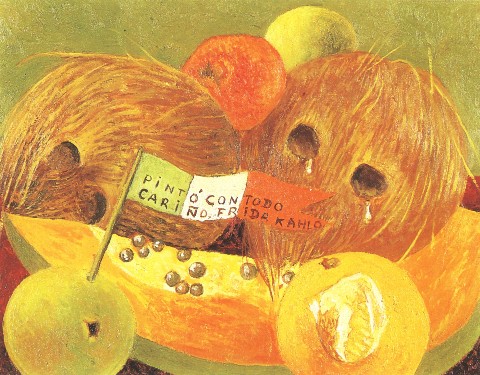Weeping
Coconuts
or
Coconut
Tears
1951
In the last years of Frida's life she painted mostly small scale still life paintings. Because of her degrading physical appearance, it may be that she no longer felt that she wanted to portray her true image in a self-portrait. Instead, by proxy, she projected her pain and emotions onto the wounded fruits and weeping coconuts of her still life paintings.
In this still life, the main focus is a weeping coconut. Perhaps an indication of her emotional state at the time.
At this point in her life, Frida relied heavily on prescription medications to ease her pain. Sometimes mixed with alcohol, they began to affect her ability to paint with the precision and detail for which she was known. For this reason she may have turned to painting still life because they require less detail and could be executed without the precision brush strokes required of her self portraits. The size of her paintings is now smaller and the composition rather crude with the use of fewer pieces of fruit. If you compare the level of detail and precision in this painting to one done earlier in the year (Still Life with Parrot and Flag) you can see a noticeable difference. If you further compare this painting to one painted in 1954 (Still Life with Flag) the differences are even more dramatic.
This small Still Life was painted as a gift for Elena Boder, a physician friend. The original inscription on the flag included Boder's name in the dedication:
"For Elena Boder,
Painted with Great
Affection, Frida Kahlo".
Elena didn't particularly like the painting and returned
it to Frida. She had hoped to get another painting in exchange but didn't.
Kahlo promptly painted over the "For Elena Boder" portion
of the dedication and sold it.

Oil
on masonite
9" x 12"
On Loan to
The Los Angeles County Museum of Art
by
Bernard and Edith Lewin,
Palm Springs, California
Óleo sobre fibra dura
23,2 x 30,5
cm.
El Préstamo a
El diario Los Ángeles Museo de Arte del Condado
por
Bernard and Edith Lewin,
Palm Springs, California. EE.UU.
Cocos llorando
1951
Durante los últimos años de la vida de Frida, pintó por la mayor parte, pequeñas naturalezas muertas. Debido a la decadencia de su apariencia física, quizás ya no quería mostrar su autentica imagen en un autorretrato. En su lugar, enfocó su dolor y emociones en las frutas heridas y en los cocos llorando de sus naturalezas muertas.
En esta naturaleza
muerta, el foco principal es un coco llorando, quizás una indicación
de su estado emocional en ese entonces.
En este punto de su vida, Frida se apoyaba muchísimo en medicamentos para calmar su dolor. Algunas veces los mezclaba con alcohol y empezaron a afectar su habilidad para pintar con la precisión y detalle por los cuales era conocida. Debido a esta razón, podría haberse dedicado a pintar naturalezas muertas, ya que requerían menos detalle y podrían ser ejecutados sin las pinceladas precisas que requerían sus autorretratos. La medida de sus pinturas era ahora mas pequeña y la composición bastante rudimentaria, con el uso de menos piezas de fruta. Si se compara el nivel de detalle y precisión en esta pintura, con una realizada a principios de ese año ("Naturaleza muerta con Perico y Bandera"), se aprecia una notable diferencia. Si además comparamos la pintura con la pintada en 1954 ("Naturaleza Muerta con Bandera"), las diferencias son incluso más dramáticas.
Esta pequeña naturaleza muerta fue pintada como un regalo para Elena Boder, una doctora amiga suya. La inscripción original en la bandera incluía su nombre y la dedicatoria:
"Para
Elena Boder,
pintó
con todo
cariño, Frida Kahlo"
A Elena no le gustó el cuadro y lo devolvió a Frida. Esperaba conseguir otro cuadro para reemplazarlo pero no fue así. Kahlo inmediatamente pintó sobre la dedicatoria "Para Elena Boder" y lo vendió.